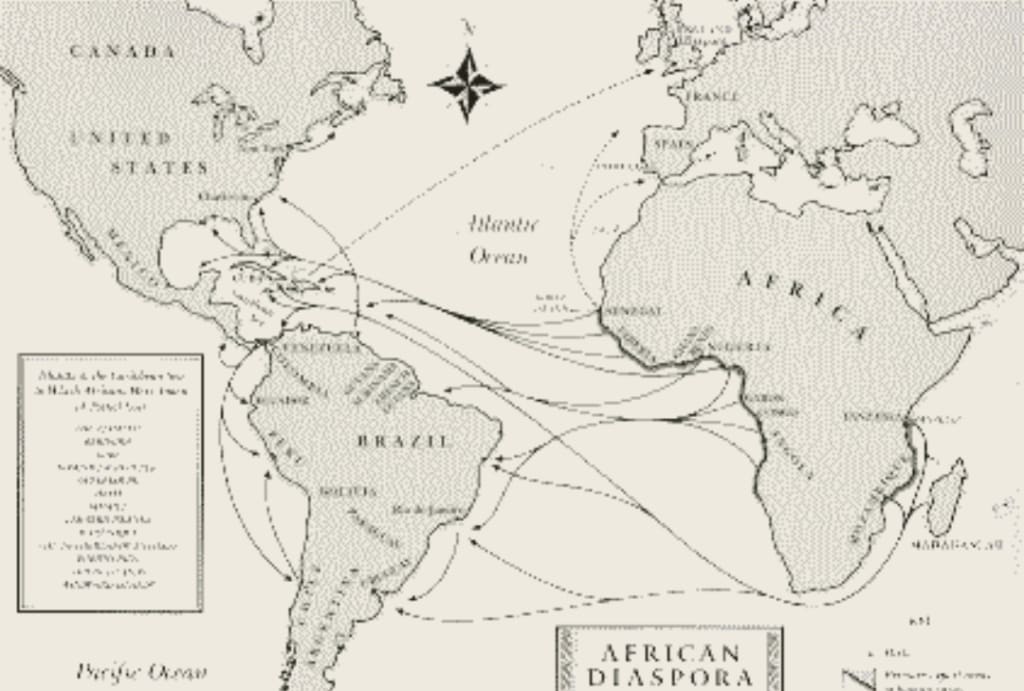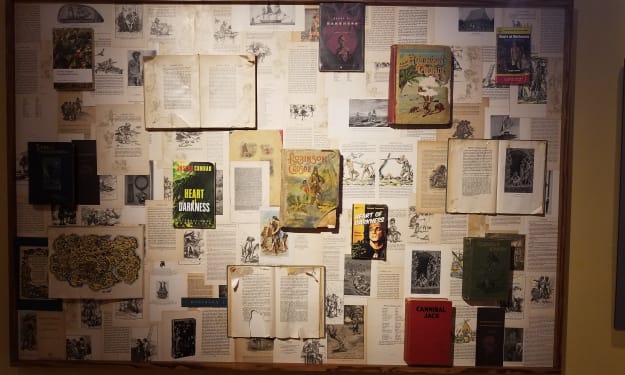
Throughout the journey from Africa to Montserrat, Equiano possessed a strong conscience, curiosity, dedication, and overall, high morals. Even though he was separated from his sister in the process, he maintained even the smallest amount of hope. With those traits, he was able to improve himself and be favored by those he came across. He builds confidence as well as bravery from each situation he was faced with.
There are a few situations that demonstrated his strong conscience, one of those situations is when after he was kidnapped from his home and separated from his sister, Equiano belonged to a Gold Smith. A month had passed, and he could walk further away from the house. He had used these opportunities to figure out the direction he needed to head to, to get closer to his family. When he could, he would focus on where the sun rose and set and then reflect on how it would look from his home. Prepared to seize the opportunity and figure out the course home, the plan was put on hold when he accidentally killed a chicken with a pebble. The elder slave grew angry and hurried to inform the Mistress. Alarmed and scared, for which he rarely received a beating at home, he ran and hid in the bushes (pg. 54-57). Another situation is when he was owned by a widow and her son of about the same age as him. He had strongly believed they would adopt him (pg. 60). By the second month, he was completely happy and was treated as a son by the widow, however, she had sold him, and he ended up on a slave ship. Equiano wanted to trade places with the meanest slave when he saw the multitude of miserable Black people chained together and preferred his former slavery rather than his current situation (pg. 63). Most importantly, he felt utterly depressed with the foul smell, tight spaces, beatings for not eating, that he wished to die and be relieved of his suffering (pg.64). When witnessing how the Whites looked and acted towards the Blacks and their kind, he truly believed he would die by the savages' hands (pg. 65). The third situation was when Equiano worked for Mr. Campbell. He was sent to fan his master while napping. He was afraid the clock on the mantle would tell on him if he did anything bad and thought the pictures held the great men’s spirits when they die (pg. 74), this demonstrates his strong conscience. When sold to Michael Henry Pascal, Equiano boarded the Industrious Bee and was able to sleep on sails, have plenty of food, and was nicely used. This changed his perspective on white people, though he still feared them, especially when they claim they will eat him when they run out of food (pg. 77). Lastly, when he slowly was informed about a God, he believed White people to be wise. As well as intrigued by the fact that they didn’t sacrifice, make offerings, wash their hands, and their women were not modest. He no longer felt anxiety and fear that controlled him when he saw Europeans and he no longer was afraid of new things. His grief was slowly fading, and he believed his early years of fear was ignorance, now seeing Europeans as superiors, not spirits.
When leaving a place Equiano has known his whole life, his mind is filled with endless questions and new fears, illustrating his characteristic trait, curiosity. On his journey through Africa, they stop at a place called Tinmah, there, he discovered the delicious taste of coconuts and sugar-canes. While there, he was sold to a merchant with white shells as currency. These three things were new to him and intrigued him. At the end of six to seven months after he was kidnapped, he arrived at the coast of the sea. There, waited him the slave ship, which he was soon forced on. He was persuaded that he had entered a world of bad spirits and they were going to kill him. The different skin tone, long hair, and foreign language frightened and confused him. Afraid they were going to eat him, he had fainted and wanted reassurance that they wouldn’t devour or hurt him (pg. 63). When the sellers left, he had managed to find people from his own nation who informed him they were to be taken to the White country and work for their new master (pg. 65). Another ship came and took them as part of their cargo. Equiano noticed mariners using a quadrant and grew curious about why and what it was for until they allowed him to look through it. When owned by Pascal and aboard their ship arriving in Falmouth during the spring of 1757 in England, Equiano experienced snow for the first time not understanding what it was, the purpose of it, and who made it. When informed God had created it, he was confused and curious on who God was as well as how it was possible (pg. 74). Another new experience was seeing his master and friend often read books. He would secretly talk to the books, then put it against his ear to hear the book’s response. However, none of them spoke back and he wondered why, reasoning to himself that they probably had nothing to say to him (pg.75). Summer of 1757, the master was a lieutenant of the majesty’s ship Roebuck. Equiano went to meet him in Nore and was amazed at how many men and guns were on the ship, his surprise turned into apprehension and he ceased to be surprised by the new things along with Europeans. What once was fear-driven curiosity, had developed into the love of knowledge.
Equally important, throughout his journey, Equiano demonstrated dedication in the work he performed for his master’s as well as the will to learn. This signifies another key character trait that assisted him in the long run. With his first master who was a Gold Smith, he would work the bellows, substantiating to do his best with no mistakes. A month passed, and he had gained the trust of his master who allowed him to walk further from the house. Equiano took full advantage of those walks, willing to do more work by assisting the maids to grasp an idea on how to get home. The love of his liberty was strengthened by the knowledge that he could not eat with free-born children and was determined to find his way back home to his mother and friends. Even though his plan to escape did not go the way he had wished, he had later learned a little English to emphasize what he wanted to know when he came across something new. Another form of dedication is when master Pascal wanted to change his name from Jacob to Gustavus Vass and refused to accept the name. Though he refused to accept it, he was forced to acknowledge it after being slapped consistently for not obeying. When he and his master’s mate left Guernsey to meet Pascal, Equiano was taken care of by the mate’s wife. Watching the wife wash her daughter’s face and seeing her face have a rosy color, he was determined to have the same and repeatedly washed his face, but was disappointed. The summer of 1757 in Nore, he was happy and comfortable in his new situation on the large navy ship. There, he had a group of boys to play with and experienced his first fight with a White boy to entertain the gentlemen, who then paid them after. Receiving his first bloody nose encouraged Equiano to fight harder to prevent himself from getting hurt. His bond with his master grew stronger, so when the master planned to leave to become a lieutenant of the Royal George, Equiano begged to leave with him or it would break his heart. While at Cape Breton, during the Summer of 1758, Captain Balfour constantly asked to buy Equiano, however, he and his master refused to part from each other. Further in his voyage, he learned to speak English tolerably well as well as understand others. Wanting to improve himself, he had the strong desire to become an Englishman and treasured new knowledge. When with Miss Guerins, he insisted on learning about God and pushed to be baptized in the Christian faith, so he could go to Heaven. By March 1761, Equiano arrived at Portsmouth in the beginning of December when the talk of peace between the French was announced. He was thrilled at the thought of being free and to work for himself, so he could further his education. Unfortunately, his master denied him his right and forced him to remain a slave. However, Equiano stood up for himself, determined to fight for his right by informing Pascal that he had already discussed the topic with an attorney and dear friends that his master cannot keep or sell him. In the end, his dedication did not prevent him from remaining a slave, but it did lead him to a master who treated him with the utmost respect.
In addition, his strong conscience, curiosity, and dedication were shaped by his high morals which were based on the Jewish religion and native spiritual beliefs. He remained honest to maintain his purity, washed his hands repeatedly especially before eating, in his tribe they do not fight each other or damage their bodies with scars, and the women did not eat, drink, or sleep with their men. When entering other nations and the White man's country, what he witnessed went against some of his beliefs. When working for Mr. Campbell, Equiano was shocked as well as sad to observe a woman who was cooking, wearing an iron mask that limited the movement of the jaw. Eventually, in time, a few of his morals changed, such as instead of spirits, he believed in God, was asking as many questions as possible, reading passages from the Bible, and then willingly was baptized into the Christian faith to enter Heaven when he dies. Equiano remained honest and true to remain pure as well as to have God continue to love him. He refused to make a mistake or behave badly to prevent his masters from beating him. The only exceptions were when he refused to eat when depressed and ill, also when he wished to be called Jacob rather than Gustavus Vassa. As Equiano grows throughout his journey, his curiosity develops into knowledge, his determination to escape turns to dedication to improve himself, and his fear of everything new evolves to maturity.
In conclusion, Equiano’s characteristic traits helped him with his journey in several ways. Due to his dedication in work, curiosity with anything new, strong conscience keeping him on his best behavior, and high morals pushing him to remain true and pure he was able to gain his master's trust. For those he came across, each wanted to teach him topics he wished to learn such as how to read, write, arithmetic, manners, different crafts, and God. Equiano was happy as well as comfortable in his situation, until he was forced to remain a slave and slipped into despair. Even through his anguish, he had grown out of the phase of being the young, frightened boy who knew nothing of the new places and people and into a young man with knowledge on different topics as well as hope, thriving to gain his freedom once and for all.
Bibliography
Equiano, Olaudah. The Interesting Narrative of the Life of Olaudah Equiano. [Waiheke Island]: The Floating Press, 2009. eBook Collection (EBSCOhost), EBSCOhost
About the Creator
Selena Huerta
Hi, my name is Selena. Here are a few things about me: I graduated community college, I am now a head coach and assistant coach for a cross country team, I love animals, and most of all I love any form of adventures 😊






Comments
There are no comments for this story
Be the first to respond and start the conversation.